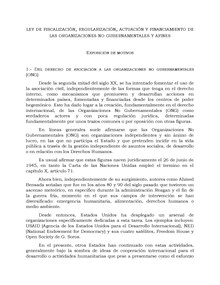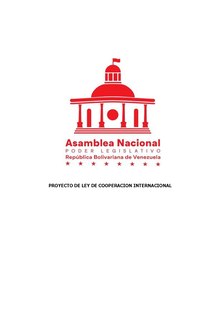Anti-Solidarity Law
[9][10][6] Likewise, the law established the obligation to provide information "to any citizen who requests it" related to statutes and activities, which has generated concern among NGOs that the confidentiality that protects, for example, victims of human rights violations, could be threatened.[12] A deputy, who remained anonymous, informed Efecto Cocuyo that the law had been presented by the United Socialist Party of Venezuela (PSUV) and distributed among the members of the foreign policy commission.[15][16] On 24 January 2023, Diosdado Cabello presented the bill under the name of "Law on Control, Regularization, Operations and Financing of Non-Governmental and Related Organisation", with 17 articles and 2 transitory provisions.[1][2] Cabello stated that he had a first list of 62 non-governmental organizations likely to be regulated by the law, including Súmate, PROVEA, Futuro Presente, Lidera, Instituto Parliamentario Fermín Toro and Más Ciudadanos, linked to the Andrés Bello Catholic University (UCAB).[22] Juan Guaidó stated in response that Nicolás Maduro's administration sought to persecute and outlaw Venezuelan non-governmental organizations, in addition to deepening Venezuela's humanitarian emergency.The director of Access to Justice, Alí Daniels, denounced that the fines established in the law, between 3000 and 12000 dollars, were unpayable for any NGO, stating that they were designed to be unenforceable and to outlaw organizations.During the same press conference, Daniels denounced the detention of activist María Fernanda Rodríguez, of Lidera and Sinergia, at the Metropolitan University of Caracas, declaring that persecution would increase if the law was approved.[4] The Alliance for Freedom of Expression, which groups Venezuelan civil society organizations, warned that "One of the most worrying consequences of this proposal is that it increases the risk of millions of people in the country in critical situations who today benefit from social, humanitarian and human rights programs in the midst of a long-lasting structural crisis.The absence of effective institutional guarantees for the protection of rights resulted in the displacement of more than 7 million people, which turned Venezuela into the focus of a migratory crisis without precedent in the continent".

National Assembly of VenezuelaLong titleSpanishDiosdado CabelloV National Assembly of VenezuelaNicolás Maduronon-governmental organizationsUnited Nations High Commissioner for Human RightsVolker TürkIndependent International Fact-Finding Mission on VenezuelaII National Assembly of VenezuelaCilia FloresAmnesty InternationalCon El Mazo Dandointernational sanctions against VenezuelaHuman Rights Watchfreedom of speechEfecto CocuyoUnited Socialist Party of VenezuelaSúmatePROVEAAndrés Bello Catholic UniversityJustice FirstPopular WillDemocratic AllianceJosé BritoJorge RodriguezRamón Guillermo AveledoDinorah Figuera2015 opposition National Assemblygag lawRocío San MiguelMaría Fernanda RodríguezMetropolitan University of CaracasInternational Federation for Human RightsLaw against HatredHuman rights in VenezuelaTal CualEuronewsEl PaísEl ImpulsoinfobaeRunrunesDeutsche WelleCrisis in VenezuelaProtests against Nicolás MaduroVenezuelan presidential crisisHistory of Venezuela (1999–present)COVID-19 pandemicEconomic crisisBolivarian missionsBolivarian RevolutionBolivarianismCensorshipChavismoDefectionsDevaluation of the Venezuelan bolívarEconomic policies under Nicolás MaduroEnergy crisisZulia energy collapseHyperinflationIllegal drug tradeInternational sanctionsU.S. sanctionsInterventions of political partiesNegotiationsRefugee crisis and diasporaResource shortagesState protectorsState-sponsored terrorismStates of emergency in VenezuelaCatatumbo campaignPemon conflictCoronavirus pandemicColombian diplomatic crisisDeath of Franklin BritoPDVAL affairParliamentary electionIII National Assembly of VenezuelaAmuay tragedyPresidential electionRegional electionsDeath of Hugo ChávezDakazoMunicipal electionsLa Salida2014 proteststimelinePanama diplomatic crisis (1st)Defense of Human Rights and Civil Society ActDetention of Antonio LedezmaColombian diplomatic/migration crisisResolution 86102015 protests (timeline)Narcosobrinos affairIV National Assembly of VenezuelaTumeremo massacre (1st)Recall referendum movement2016 protests (timeline)Constitutional crisisMother of All MarchesCaracas helicopter incidentReferendumNational Assembly attackConstituent Assembly electionMembersAttack on Fort ParamacayDeath of Carlos Andrés García2017 protestsEl Junquito raidPresidential campaign of Nicolás MaduroValencia firePanama diplomatic crisis (2nd)El Paraíso stampedeCaracas drone attackDetention of Juan RequesensEconomic reforms and Viernes RojoMurder of Fernando AlbánTumeremo massacre (2nd)2018 protests (timeline)Inauguration of Nicolás MaduroVenezuela TPS Act of 2019Plan PaísHumanitarian aid missionAmnesty LawVenezuela Aid Live